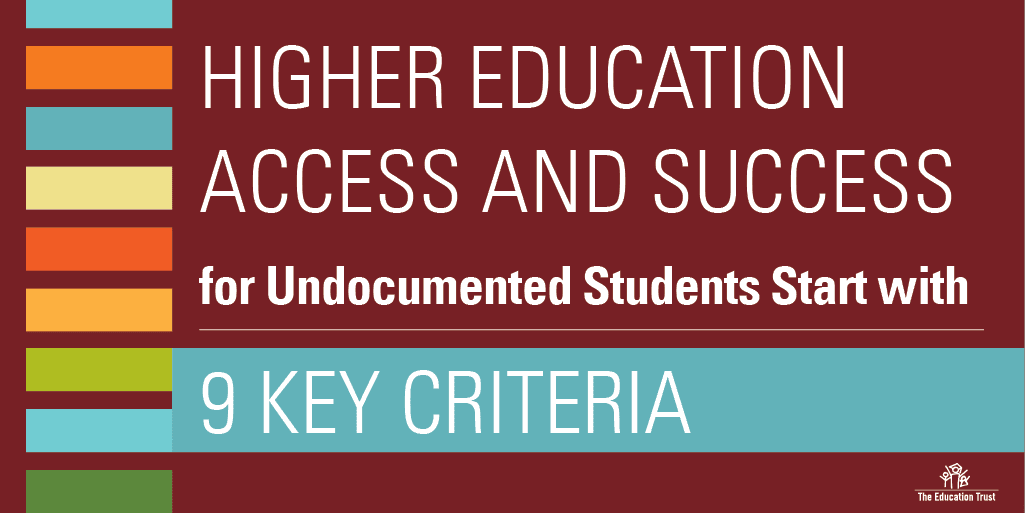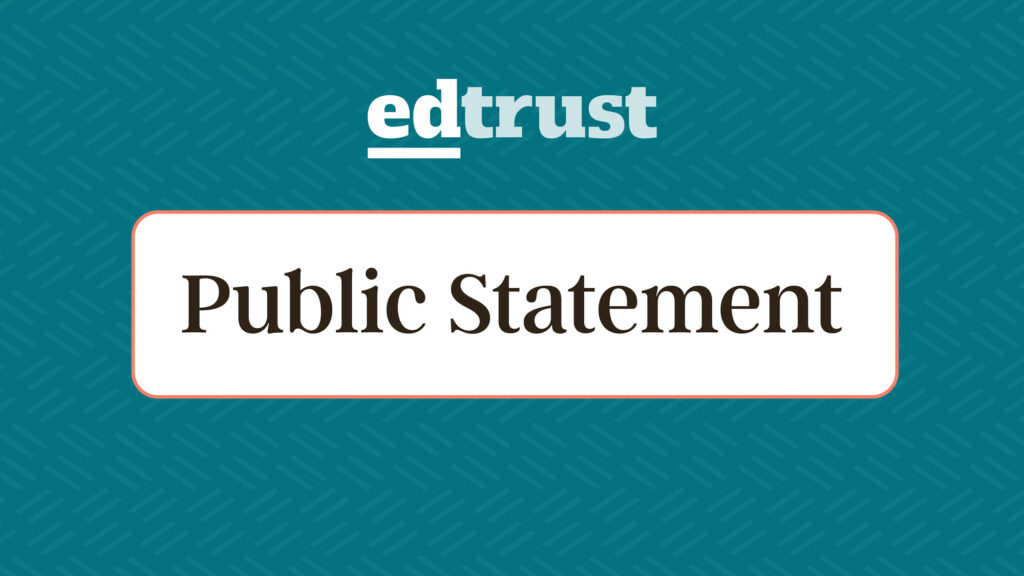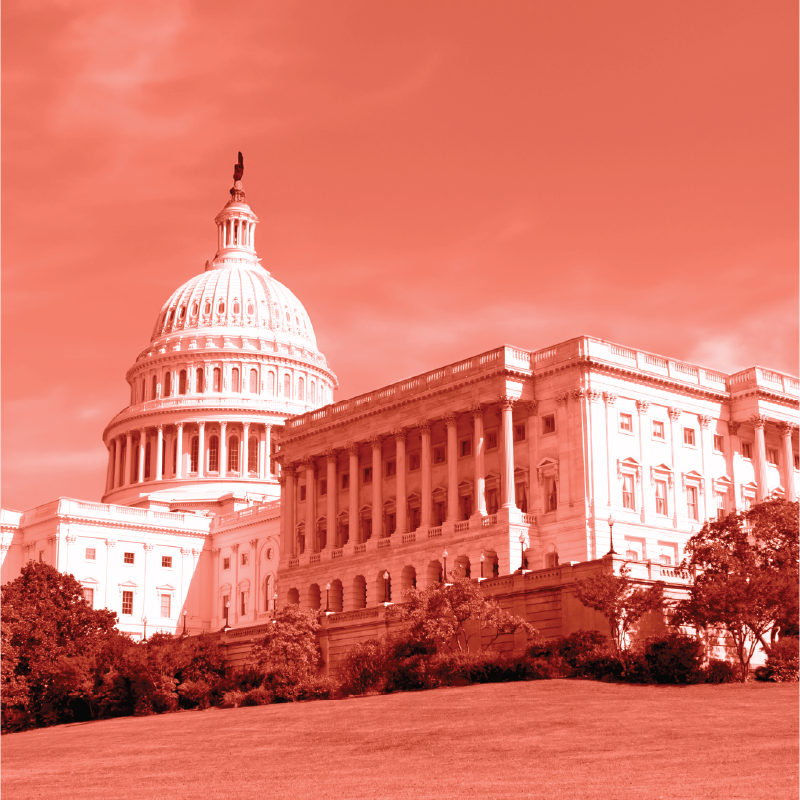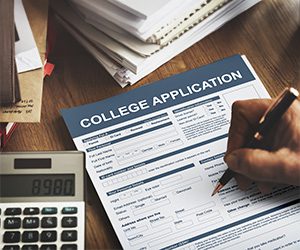Over 427,000 Undocumented Students Face Challenges in Higher Education, Workforce and Accessing Social Services
New Ed Trust Report Finds How Government Can Provide Necessary Immigration Reforms
WASHINGTON – Immigration reform continues to hit roadblocks, leaving undocumented immigrants in limbo. Of the estimated 11 million undocumented immigrants currently in the US, one segment of this population is consistently overlooked in calls for reforms — undocumented students pursuing a higher education. More than 427,000 undocumented students are currently enrolled in colleges and universities across the country.
Yet those students are underserved in a variety of ways that not only limit their progress but also threaten their humanity. Restrictions on in-state tuition, driver’s license eligibility, state-based financial aid, and supportive services like food and housing assistance are among the hurdles facing undocumented students. And if the Deferred Action for Childhood Arrivals (DACA) program is struck down, those hurdles could multiply, and many undocumented students’ lives could be upended. These students deserve a system that supports them, given their many economic and cultural contributions to our country.
“College access and success for undocumented students has been ignored for far too long. Although 1 in every 50 students in higher education is undocumented, this community of students is treated differently by state and federal policymakers, simply on account of their immigration status,” says Jessie Hernandez-Reyes, a senior policy analyst at Ed Trust and one of the authors of the report. “At a time when DACA and immigration reform are at a crossroads, we urge state and federal policymakers to consider the ways in which state and federal policies can be improved to make a college education accessible, affordable, and beneficial for undocumented students and, by effect, further strengthen the nation as whole.”
With that in mind, The Education Trust’s new report, “Higher Education Access and Success for Undocumented Students Starts with 9 Key Criteria,” analyzes policies in 15 states with sizeable undocumented college student populations to determine whether their policies make it easier or harder for these students to attain a college degree and career success.
“I applaud the Education Trust for its efforts to identify and uplift actionable policy changes that are needed to be inclusive of undocumented students seeking higher education. It’s no secret that our immigration system is broken, and the basic humanity, dignity, and livelihoods of millions of undocumented people at every stage of life hang in the balance.
“The Ed Trust report shines a light on the reforms necessary to provide equity for the more than 427,000 undocumented students seeking a higher education, a pathway to citizenship, and economic mobility. It’s high time that we let undocumented immigrants live without fear and start honoring their many contributions. For so long, limited and insufficient relief for undocumented youth has cruelly pitted children against their parents and families. It’s critical that immigration policies not vilify or exclude some members of the immigrant community. As we pursue more humane and comprehensive immigration reform, we should also work to provide undocumented students with an inclusive higher education environment and access to the opportunities that are supposed to come with a college education. Barriers to college entry, financial aid, employment, and supportive social services can and need to be brought down, and doing so will require federal and state policy shifts.” – Congresswoman Delia Ramirez (IL-03)
Of the 15 states examined in the report, Ed Trust finds that:
- Eight states prohibit undocumented students from accessing professional/commercial licenses.
- Five states restrict or prohibit undocumented students from receiving state financial aid.
- Seven states deny access to state-funded housing assistance to undocumented students AND, due to federal funding restrictions/guidelines for state-funded food assistance programs, undocumented students are not eligible for state-funded food assistance.
- Nine states have at least one policy that limits local cooperation with federal immigration authorities to identify, detain, or deport undocumented individuals.
Undocumented college students and graduates already face an uphill battle, and the patchwork of state policies and restrictions is making it more difficult for many of them to navigate the higher education system, maintain gainful employment, and realize their full potential.
“Identifying the key states and state policies that reduce barriers and support undocumented students’ higher education success, as well as those that limit their access and equity to and through college, is a crucial step to achieving meaningful change. This Ed Trust report is clear, compelling, and especially timely, given the devastating impasse at the federal level to protect dreamers and the ongoing legal threats to DACA,” says Miriam Feldblum, co-founder and executive director of the President’s Alliance on Higher Education and Immigration.
The report also provides policy recommendations for state and federal legislators on expanding access to a higher education for undocumented students.
The recommendations include:
- Repealing 20 U.S.C. 1091(a)(5) of the Higher Education Act to make all undocumented students eligible for federal financial aid.
- Expanding state public benefits (including higher education benefits, and access to professional/commercial licenses, state Medicaid, housing, and food assistance) to all undocumented individuals.
- Making all forms of state financial aid — including free college programs — available to all undocumented residents, those with and without DACA.
- Making in-state tuition available to all undocumented students, regardless of DACA eligibility.
- Enacting a pathway to citizenship for all undocumented individuals.
- And more …
###
The 15 states with the largest shares of undocumented college students that The Education Trust analyzed include: Arizona, California, Colorado, Florida, Illinois, Georgia, Maryland, Massachusetts, Nevada, New Jersey, New York, North Carolina, Texas, Virginia, and Washington.






 July 10, 2025 by
July 10, 2025 by 
